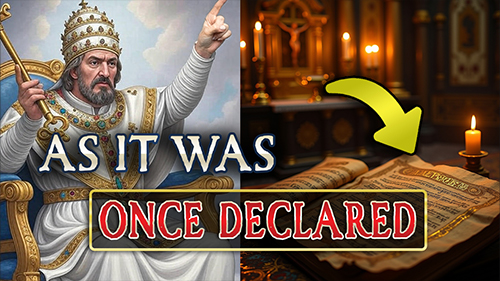| Recent Featured Videos and Articles | Eastern “Orthodoxy” Refuted | How To Avoid Sin | The Antichrist Identified! | What Fake Christians Get Wrong About Ephesians | Why So Many Can't Believe | “Magicians” Prove A Spiritual World Exists | Amazing Evidence For God | News Links |
| Vatican II “Catholic” Church Exposed | Steps To Convert | Outside The Church There Is No Salvation | E-Exchanges | The Holy Rosary | Padre Pio | Traditional Catholic Issues And Groups | Help Save Souls: Donate |  |









 " />
" /> " />
" /> " />
" /> " />
" /> " />
" />




The Athanasian Creed
The Athanasian Creed is one of the most important creeds of the Catholic Faith. It contains a beautiful summary of a Catholic’s belief in the Trinity and the Incarnation, which are the two fundamental dogmas of Christianity. Before the 1971 changes in the Liturgy, the Athanasian Creed, consisting of 40 rhythmic statements, had been used in the Sunday Office for over a thousand years. The Athanasian Creed sets forth the necessity of believing the Catholic Faith for salvation. It closes with the words: “This is the Catholic Faith, which, except a man believe faithfully and firmly, he cannot be saved.” The Athanasian Creed was composed by the great St. Athanasius himself, as the Council of Florence confirms.
The above definition of the Athanasian Creed at the ecumenical Council of Florence means that this creed qualifies as a pronouncement from the Chair of St. Peter (an ex cathedra pronouncement). To deny that which is professed in the Athanasian Creed is to cease to be Catholic. The Creed declares that whoever wishes to be saved needs to hold the Catholic Faith and believe in the Trinity and the Incarnation. Notice the phrase, “whoever wishes to be saved” (quicunque vult salvus esse).
This phrase is without question the product and inspiration of the Holy Ghost. It tells us that everyone who can “wish” must believe in the mysteries of the Trinity and the Incarnation in order to be saved. This does not include infants and those below the age of reason, since they cannot wish! Infants are numbered among the Catholic faithful, since they receive the habit of Catholic Faith at the Sacrament of Baptism. But, being below the age of reason, they cannot make any act of faith in the Catholic mysteries of the Trinity and the Incarnation, an act which is absolutely necessary for the salvation of all above the age of reason (for all who wish to be saved). Is it not remarkable how God worded this infallible creed’s teaching on the necessity of belief in the mysteries of the Trinity and the Incarnation in a way that would not include infants? The creed, therefore, teaches that everyone above the age of reason must have a knowledge and belief in the mysteries of the Trinity and Incarnation to be saved – no exceptions. This creed, therefore, eliminates the theory of invincible ignorance (that one above the age of reason can be saved without knowing Christ or the true Faith) and further renders those who preach it unable to profess this creed with honesty.
And the fact that no one who wishes to be saved can be saved without a knowledge and belief in the mysteries of the Trinity and the Incarnation is the reason why the Holy Office under Pope Clement XI responded that a missionary must, before baptism, explain these absolutely necessary mysteries to an adult who is at the point of death.
Another question was posed at the same time and answered the same way.
The dogma that belief in the Trinity and Incarnation is absolutely necessary for salvation for all those above the age of reason is also the teaching of St. Thomas Aquinas, Pope Benedict XIV and Pope St. Pius X.
Those above the age of reason who are ignorant of these absolutely necessary mysteries of the Catholic Faith – these mysteries which are a “necessity of means” – cannot be numbered among the elect, as Pope St. Pius X confirms.
So let those who believe that salvation is possible for those who don’t believe in Christ and the Trinity (which is “the Catholic Faith” if defined in terms of its simplest mysteries) change their position and align it with Catholic dogma. There is no other name under all of heaven whereby a man is saved other than the Lord Jesus (Acts 4:12). Let them cease contradicting the Athanasian Creed and let them confess that knowledge of these mysteries is absolutely necessary for the salvation of all who wish to be saved. They must firmly hold this so they can themselves possess the Catholic Faith and profess this creed with honesty and as our Catholic forefathers did.
These essential mysteries of the Catholic Faith have been disseminated and taught to most by means of the Apostles’ Creed (which is given in the Appendix). This vital creed includes the central truths about God the Father, God the Son (Our Lord Jesus Christ – His conception, crucifixion, ascension, etc.) and God the Holy Ghost. It also contains a profession of Faith in the crucial truths of the holy Catholic Church, the communion of saints, the forgiveness of sins and the resurrection of the body.
There is No Salvation for members of Islam, Judaism or other heretical or schismatic non-Catholic sects
So far we’ve seen that it’s an infallibly defined dogma that all who die as non-Catholics, including all Jews, pagans, heretics, schismatics, etc. cannot be saved. They need to be converted to have salvation. Now we must take a brief look at more of what the Church specifically says about some of the prominent non-Catholic religions, such as Judaism, Islam, and the Protestant and Eastern schismatic sects. This will illustrate, once again, that those who hold that members of non-Catholic religions can be saved are not only going against the solemn declarations that have already been quoted, but also the specific teachings quoted below.
1. Specific Catholic Teaching Against Judaism
2. Specific Teaching Against Islam
3. Specific Catholic Teaching Against Protestant and Schismatic Sects
4. Concerning Those Baptized Validly as Infants by Members of Non-Catholic Sects
[1] Decrees of the Ecumenical Councils, Vol. 1, pp. 550-553; Denzinger 39-40.
[2] Denzinger 1349a.
[3] Denzinger 1349b.
[4] St. Thomas Aquinas, Summa Theologica, Pt. II-II, Q. 2., A. 7.
[5] St. Thomas Aquinas, Summa Theologica, Pt. II-II, Q. 2., A. 8.
[6] The Papal Encyclicals, Vol. 1 (1740-1878), p. 45.
[7] The Papal Encyclicals, Vol. 1 (1740-1878), p. 46.
[8] The Papal Encyclicals, Vol. 3 (1903-1939), p. 30.
Sign up for our free e-mail list to see future vaticancatholic.com videos and articles.
Recent Content
^